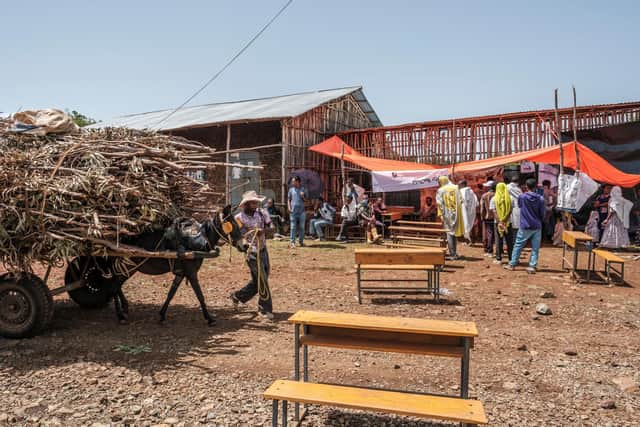Cost of living is bad for people in Yorkshire but worse for parts of Africa and Asia - Fionna Smyth, Christian Aid
I dreaded it because, while difficult for me and my family, I know there will be many who don’t know how they’re going to pay. It’s just one of the many costs that are going up. And that’s just in the UK.
My role for the international development agency Christian Aid is to highlight the plight of people in poverty around the world and campaign for the change that will lift them out of it.
Advertisement
Hide AdAdvertisement
Hide AdI know that poverty is relative but the people I work with and for are living in extreme poverty on less than two dollars a day.


The rising cost of living is certainly bad for people in Yorkshire but catastrophic if you’re trying to buy food in parts of Africa and Asia. There’s little in the way of energy price caps and government support there.
We are still an affluent society – despite all our economic troubles. But in East Africa, for example, it’s a matter of life and death.
Food inflation in Ethiopia is a staggering 44 per cent while in Kenya the price of maize flour, the main food staple, has doubled in seven months.
Advertisement
Hide AdAdvertisement
Hide AdPeople there are acutely vulnerable because they spend over half their income on food. With unaffordable prices like these, they are facing a humanitarian disaster.
In Afghanistan, the World Food Programme says over nine in 10 of the population does not have enough to eat.
This month we interviewed families across three provinces where life is a never-ending quest to earn, beg or borrow money to eat. Others have had no option but to make the soul-crushing decision of which child to sell into marriage to avoid the rest going hungry.
Like the Covid pandemic before it, Vladimir Putin’s invasion of Ukraine has shown what a fragile and connected world we live in.
Advertisement
Hide AdAdvertisement
Hide AdEven though some Ukrainian grain ships have been allowed through the Russian blockade, it’s not on a scale big enough to bring down the price of sunflower oil and fertiliser to pre-Covid levels.
The impact of the war has accelerated food price hikes and has made a dire situation in places like Afghanistan even worse.
While terrorising the Ukrainian people with artillery and missiles, Moscow’s stranglehold on oil and gas supplies to Europe is also threatening a host of other economic consequences by making almost everything everywhere more expensive.
Putin has much to answer for but prices of food and energy were rising even before the war in Ukraine. The reason why there is not high resilience in the global food system is because it’s fundamentally broken. There’s enough food to feed the world but production is mainly in the hands of a few countries and large agri-business.
Advertisement
Hide AdAdvertisement
Hide AdThe top four grain traders have seen near-record profits or sales this year in the middle of a global food crisis. This leaves the world vulnerable to breakdowns and high price volatility.
Add climate change to this toxic mixture and it’s clear our current trading and market arrangements are unsustainable, both for people and our planet. Taken all together, it’s putting millions on the brink of starvation.
It’s not hopeless. Peace will return to Ukraine at some point and it will once again take its place as a major exporter of food. Meanwhile Christian Aid and other charities do what they can to help. But charities were never meant to take the place of governments. The aid system is not designed for the size and length of the crises we see today.The old model of slowly reacting, then launching big appeals and delivering costly emergency aid too late amounts to a humanitarian sticking plaster.
It’s time to rip that plaster off and examine the deeper structural problems. Otherwise, we will repeat this miserable cycle of crisis and dependency.
Advertisement
Hide AdAdvertisement
Hide AdWe know where to start. Local people understand their land and how to innovate with the right kind of support. That’s our experience of working alongside our partners in Kenya, Ethiopia and South Sudan, where people’s resilience to failed harvests and rising food prices can be significantly improved.
In the UK we might have to learn to do things differently too.
Over the summer we had a taste of what it can be like to live in countries affected by political paralysis, drought, climate change and the soaring price of essentials. Perhaps the future is already here – for now it’s just unevenly distributed.
Fionna Smyth is head of global advocacy and policy at Christian Aid.